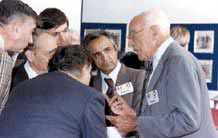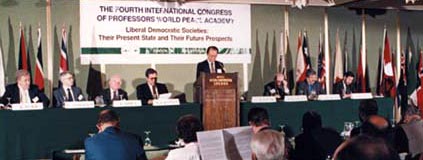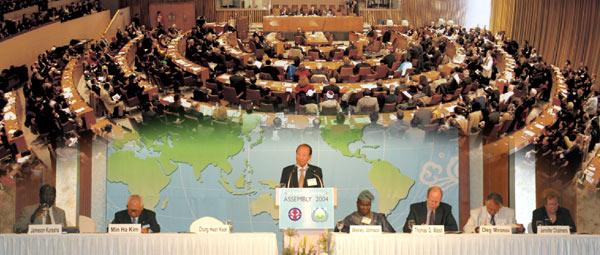ACADEMIA:
The Search for Absolute Values in Science and the Unity of Knowledge
The Search for Absolute Values in Science and the Unity of Knowledge
"You may ask why a religious figure would fund a conference on science. The reason is because God is the greatest scientist of all. The complicated problems of the world cannot be fully understood within the narrow perspectives of individual fields of knowledge.I recognize that in the Middle Ages religious dogmatism blocked scientific exploration and limited man's material development. However, it is also a big mistake for humanistic thinkers since the Age of the Enlightenment to hold that religious belief is inferior to reason and that man's spiritual needs are in conflict with human reason." - Reverend Sun Myung Moon
International Conferences on the Unity of the Sciences (ICUS)
 Founded in 1968, the International Conferences on the Unity of the Sciences (ICUS) was a ground-breaking organization to promote the interdisciplinary dialogue among the sciences, dialogue between science and the humanities and the search for absolute values via the sciences. There have been 21 international conferences including one in 1974 that included 17 Nobel Laureates. A truly pioneering and visionary endeavor, ICUS was the first organization to give top scientists an interdisciplinary forum to solve global problems, advance multidisciplinary scientific knowledge and the scientific search for universal values.
Founded in 1968, the International Conferences on the Unity of the Sciences (ICUS) was a ground-breaking organization to promote the interdisciplinary dialogue among the sciences, dialogue between science and the humanities and the search for absolute values via the sciences. There have been 21 international conferences including one in 1974 that included 17 Nobel Laureates. A truly pioneering and visionary endeavor, ICUS was the first organization to give top scientists an interdisciplinary forum to solve global problems, advance multidisciplinary scientific knowledge and the scientific search for universal values. 
Sir John Eccles, Nobel Laureate in Medicine
and Physiology, at ICUS in 1976.
“I wish to thank Reverend Moon for sponsoring the ICUS meetings. They have given me not only pleasure and stimulation. They also brought me back to the fundamental problems which one is inclined to forget if one strives for the solution of a special problem of one’s prime interest.”
Eugene P. Wigner, Nobel Laureate in Physics
"I was first attracted to ICUS because of four factors: ICUS conferences were concerned with values. They did not subscribe to the value-free ideology then dominating academia. Secondly, they were interdisciplinary, unlike the work going on in colleges and universities, which led to a variety of absurdities including B.F. Skinner’s claim that dignity and freedom were meaningless conceits. Thirdly, the participants were highly distinguished; and last, they came from almost every country and culture in the world."
Dr. Morton Kaplan, Professor of Political Science, University of Chicago and Chair of the 9th ICUS conference
These seventeen conferences, each attended by several hundred scientists, have produced a tremendous intellectual output that has not only benefited the participants, but the publication of books has had an impact on scholarship thoughout the world. The academic participants have carried the message back to the classrooms and passed on their learning to countless students, thus multiplying the impact manifold.”
S. Fred Singer, Professor of Enviromental Sciences, University of Virginia
Professors World Peace Academy (PWPA)
 Founded in 1973 in recognition of the central role academics play in culture and society, the Professors World Peace Academy organizes and mobilize academics on the crucial issues of the day in their respective countries and internationally. PWPA has sponsored more than 50 national and international conferences on the most pressing issues of the day.
Founded in 1973 in recognition of the central role academics play in culture and society, the Professors World Peace Academy organizes and mobilize academics on the crucial issues of the day in their respective countries and internationally. PWPA has sponsored more than 50 national and international conferences on the most pressing issues of the day. In His Words: ”I founded the Professors World Peace Academy to be trailblazing organization at this critical moment in human history able to mobilize intellectuals who have devoted their lives the advancement of human wisdom and enable them to play a leading role in overcoming the dangers of the age and opening new pathways to world peace.“

Opening Plenary Session of the 4th PWPA International Congress
"PWPA should be international, multidisciplinary, future-oriented and action-oriented. No single discipline, no local prescription can solve the problems facing humanity. Mutual cooperation beyond national and regional boundaries and interdisciplinary study beyond limited specializations are absolutely necessary.”
PWPA Outstanding Achievements:
“The Fall of the Soviet Empire” Conference August 1985 in Geneva, Switzerland.
The story: In 1984, Alexis Rannit, an émigré Estonian poet, sent a letter to PWPA that all empires fall and suggesting that the Soviet Empire should be studied so that its collapse could be peaceful. Dr. Morton Kaplan took the proposal for a conference titled The Fall of the Soviet Empire to Reverend Moon. Reverend Moon had already predicted that the Soviet empire would fall within 70 years of its founding, since it did not address the reality of human spiritual life. He agreed to sponsor the conference.
A number of prominent Sovietologists were skeptical of the conference title, but it turned out to be prophetic. One important conference participant later commented: “The conference not only more accurately predicted what was to happen in the Soviet Union than any other source, but I believe it also helped shape the unfolding of the system in a more peaceful way than might otherwise have happened.”
Unification Thought Institute
In His Words: “Unification Thought presents a new view of life, a new view of the world, a new view of the universe and a new view of God’s work in history. It is also a principle of integration that can bring different religious doctrines and philosophies into unity, while preserving their unique characteristics.”
Paragon House
 A publishing house founded in 1981
to serve the community of ICUS and PWPA scholars. Paragon House offers
books of cultural and intellectual significance with an international
and interdisciplinary character. It has published more than 1000 new
books by respected authors in their fields which include Sir John Eccles,
Morton Kaplan, Huston Smith, Richard
Rubenstein, Nancy Tuana, Peter Marshall, Geddes MacGregor, John Carmody,
Eve Browning Cole, John Roth and others.
A publishing house founded in 1981
to serve the community of ICUS and PWPA scholars. Paragon House offers
books of cultural and intellectual significance with an international
and interdisciplinary character. It has published more than 1000 new
books by respected authors in their fields which include Sir John Eccles,
Morton Kaplan, Huston Smith, Richard
Rubenstein, Nancy Tuana, Peter Marshall, Geddes MacGregor, John Carmody,
Eve Browning Cole, John Roth and others.

